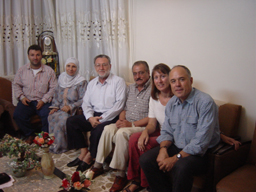
At home in Aleppo
We depart from Turkey at a small border crossing south of Kilis. Customs clearance at the Turkish border takes exactly ten minutes because we are far and wide the only vehicle around. But on the other side, clearance into Syria is tough. We had heard that the most unmotivated and unfriendly border guards in all of Syria are at this location. And we can now confirm it. One official, who, while inspecting our papers is lolling on the sofa, decides to take off for lunch leaving us to a 45-minute wait. We have to pay a diesel compensation fee so that for the 14 days that we want to stay in the country we have to dole out a hefty US$220. Our internationally-recognized vehicle insurance is not acknowledged, which costs us another US$28 for accident insurance with a dubious amount of coverage. These „additional costs„ make Syria the most expensive country for us regarding diesel fuel prices.
In Aleppo we move into a beautiful apartment procured through Munkari Kutayba, the president of the German-Syrian Friendship Society. The family takes us completely into their lives and we enjoy their genuine hospitality. Many talks, including those with an ex-member of the government of Syria, allow a very interesting look behind the scenes in this country.
 At home in Aleppo |
Aleppo was also an important Silk Road intersection, where one side road continues from here to Istanbul and another runs south from here to Alexandria. Even today this second largest city of Syria plays an important economic role as trade center. We remain for three days in Aleppo and visit the citadel, which was built on a forty-meter high hill to guard the city. Even though we've seen quite a few bazaars in our travels, the medieval Souq of Aleppo remains unchanged since then and we spend a few hours under the roofed labyrinth. You can relax in one of the many bathhouses (hammams), where you can perspire in the steam bath in addition to getting soaped and massaged. The hammams are not only built for a purpose, but are architectural masterpieces as well.
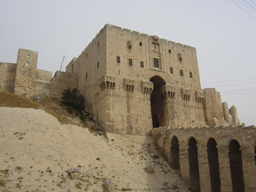 Citadel |
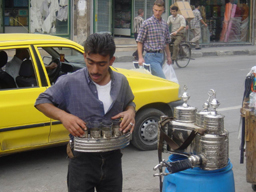 Drink seller |
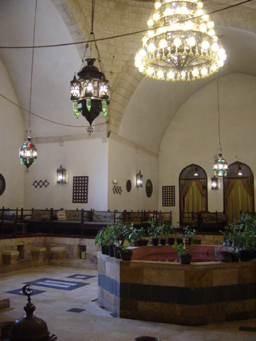 Hammam |
On the outskirts of Aleppo we take a look at a few of the over 600 ghost towns from the Byzantine era that were deserted without any noticeable damage. Scientists today puzzle over why all these places were seemingly abandoned. Was it the change in trade routes (over the Silk Road) as one theory claims?
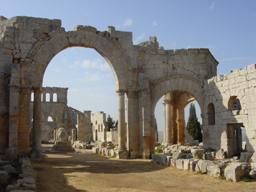 Basilica Qala' at Samaan |
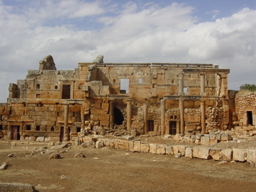 Ghost town |
Our way takes us in the next days along the Euphrates River Valley, one with impressive historical vestiges of the Silk Road. Even though after ten months our ability to absorb cultural-historic adventures and architecture is just about exhausted, we set out for one last adventure in Syria. Our first stop is Rafasa in the desert, where we are allowed to camp in the ruins of the fortress at the basilica.
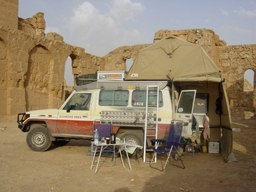 Camping in the desert fortress |
Shortly before the Iraqi border we reach the archeological site of Mari, one of the most significant trade cities between Syria and Mesopotamia. We are charmed by the ruins of Dura Europos, a large Ancient Greek-Roman fortress with a view of the Euphrates, and spend some time there. Because the view is best from the cliffs, we decide to set up camp there. But this place turns out not to be ideal when a hefty storm starts up in the night and we shake in our beds under the rooftop tent; our land cruiser getting "sand blasted".
Once we're in the Euphrates Valley we go straight through the Syrian Desert. Because we want to feel the soft sand under our tires, we take a short cut to the desert fortress of Qasr al-Heir al-Sharqui (8th century) leaving the main road behind. Navigating with GPS is not easy because our map is inaccurate, and because of flying sand we can only see a distance of a few hundred meters at the most. We are extremely relieved when we in fact arrive at the ruins in the haze.
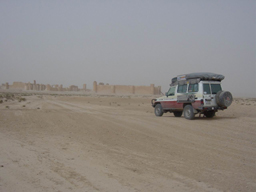 Desert navigation |
Our goal is to reach the oasis of Palmyra today, which rises up out of the sand like a mirage. A countless number of extravagant ruins are witness to the once greatness of this metropolis, reigned over by Queen Zenobia in the 3rd century AD. We are captivated by the spell of this bygone era from the vantage point right at the excavation site and stay three days. We have in our various travels seen a lot of historical sites. Palmyra certainly belongs on the list of the ten best.
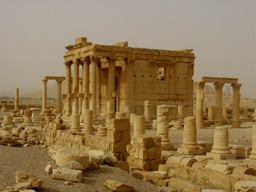 Palmyra 1 |
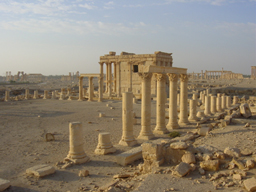 Palmyra 2 |
We end our tour through Syria with a visit to Krak des Chevaliers, a crusaders' castle. The knights of the crusades erected this castle as protection en route to Jerusalem in the year 1099 as many were, and the castle wasn't surrendered until 1271. The knights were barbarous to the people of the region, which didn't exactly help promote a peaceful coexistence between the Christians and the Moslems.
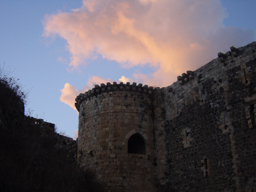 Crusade castle 1 |
 Crusade castle 2 |
Shortly before our departure to Jordan at Der'a we visit one of the most beautiful Roman theaters in Basra situated in the well-preserved old inner town.
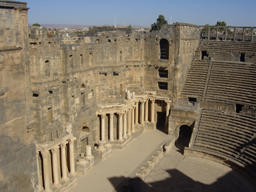 Basra |
We are certain that there is so much more to discover in Syria than what we saw in this short time period. You are not only overwhelmed everywhere in this country with an unbelievable and genuine hospitality but you are also able to find vestiges of the most important developments in every epoch of human history.
Not one police inspection unit stopped us and we were able to experience only the positive side of the state authority. We always felt safe even at our sometimes-unusual camping spots.
What bothered us was the plastic garbage along the roads and in the towns, as we had experienced it in India a while ago. It is hard to imagine that one can really feel comfortable living in a place surrounded by garbage.
We were able to feel the people's concern in Syria about the fact that it may come to war in the neighboring country of Iraq, and that a slowly developing tourist industry could experience a serious setback. We hope together with the people of Syria that the future will bring peace.
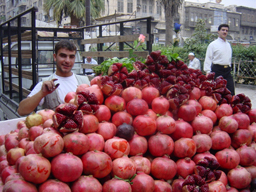 Pomegranates |